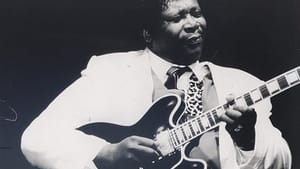Stay in the Loop
BSR publishes on a weekly schedule, with an email newsletter every Wednesday and Thursday morning. There’s no paywall, and subscribing is always free.
Remembering B.B. King

It was 1968, and the venue was the original Electric Factory, the place that was ultimately shut down by Mayor Frank Rizzo. The headliner was the Steve Miller Band. The Factory, to their credit, always had an opening act, and though my young friends and I who were at the Factory that night were students of jazz, progressive rock, and the blues, we had never heard of that night’s opening act.
His name was B.B. King. And B.B. King just passed away at the age of 89.
King didn’t come out right away. Given his roots in showmanship, even the opening act had an opening act, and he was preceded by an eight-piece band, five horns and a three-piece rhythm section, who proceeded to blow all the would-be jazzers, rockers, and wannabe hippies in attendance away with their swinging mixture of jump blues and swing. By the time the “opening act headliner” was announced, as, of course, “The King of The Blues,” the audience was sufficiently pumped to go crazy when B.B. King, live and in person, walked out on stage.
He was already a veteran of the “chitlin’ circuit,” the chain of black clubs that booked him for years, when he started getting booked in hippie joints like the Factory. But he did not change his act, his attitude, his musicianship, his work ethic, or his musical integrity to compensate for changing times. And those, perhaps, were the reasons why he reached, emotionally and otherwise, young audiences who had never heard of him. Hearing B.B. King play his beloved Lucille (a black Gibson ES-355 guitar) made believers out of everyone, regardless of age. Like Sinatra, B.B. King made it seem like he was singing and playing to you. His gift was that he made you feel.
The late 1960s was a musical era where, it seemed, all genres came together. Bands like Earth Opera; Lighthouse; Chicago; Blood, Sweat & Tears; The Mothers of Invention; Canned Heat; and Spirit, as well as those led by the likes of Steve Miller, Paul Butterfield, and Jimi Hendrix, effectively combined elements of rock, jazz, and blues to make irresistible music. Local bands like Elizabeth, Woody’s Truck Stop, Sweet Stavin’ Chain, and Mandrake Memorial did as well.
Everything old is new again
But the real importance of this musical revolution was that it opened the door for new and revived careers — and enthusiastic new audiences — for blues veterans like Muddy Waters, Howlin’ Wolf, Bo Diddley, and B.B. King. Ultimately, King was the most successful of them all, having worked 300-plus dates per year until his final performance in October of last year.
He was a major influence both on those who knew his work via his early playing (he started playing professionally in the mid-1940s) and those who didn’t discover him till his 1960s “rediscovery.” After his death on Thursday, Eric Clapton called him a beacon; fellow blues guitarist Buddy Guy said, “The way B.B. did it was the way we all do it now.” Even President Obama checked in, saying, “The blues has lost its King, and America has lost a legend. No one worked harder than B.B.”
As a person, B.B. King was a showbiz rarity: someone you never heard a negative word about. Hudson Music’s Rob Wallis, who produced a groundbreaking series of instructional music videos with King in the early 1990s and knew him intimately, could only say, “He was the most humble, gracious, and warm gentleman you could imagine.”
And of that humility, grace, and warmth? It can all be heard in the playing and singing of B.B. King.
Sign up for our newsletter
All of the week's new articles, all in one place. Sign up for the free weekly BSR newsletters, and don't miss a conversation.

 Bruce Klauber
Bruce Klauber